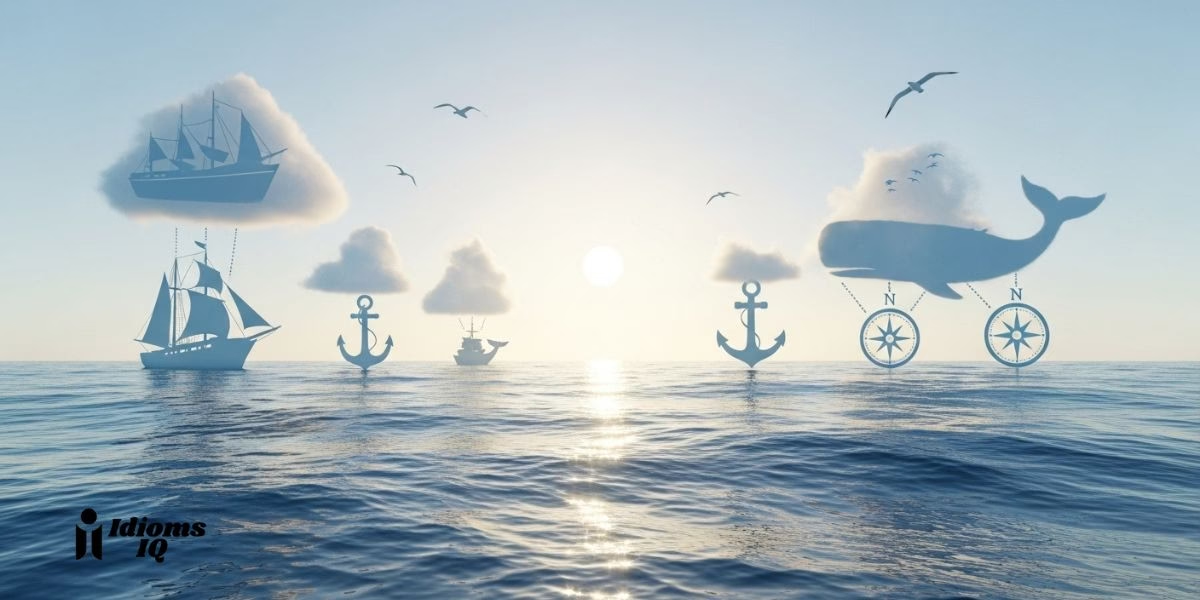
The ocean has always been a source of awe and inspiration. Its vastness, power, and mystery have captivated sailors, poets, and dreamers for centuries. It’s no surprise that this profound force of nature has given us a deep well of idioms those colorful phrases where the figurative meaning is different from the literal one.
When you say there are “plenty of fish in the sea,” you’re not talking about marine biology; you’re offering romantic advice! In art and literature, ocean idioms add a layer of depth and emotion, connecting our human experiences to the wild heart of the sea. This article will explore 40 fascinating idioms about the ocean to help your vocabulary set sail.
Why We Use Ocean Idioms in Art
Idioms are the secret language of culture, adding personality and wit to our expression. In art and writing, ocean idioms are particularly powerful. They act as a creative shorthand to describe the scale of our emotions and challenges.
Saying someone is “in deep water” instantly conveys a sense of serious trouble. These phrases make dialogue feel authentic and descriptions more imaginative, using the ocean’s familiar power and mystery to make abstract human feelings tangible and deeply resonant.
Related: Idioms for Snow
Idioms About the Ocean
Here is a list of idioms that draw their inspiration from the deep blue sea.
1. A Drop in the Ocean
- Meaning: A very small and insignificant amount compared to what is needed.
- Usage Example: “The money we raised is great, but it’s just a drop in the ocean compared to the total cost of the project.”
- This idiom emphasizes the vastness of a need by comparing a small contribution to the immense scale of the ocean.
2. Plenty of Fish in the Sea
- Meaning: There are many other romantic partners available after a breakup.
- Usage Example: “He was sad after she left him, but his friends reminded him there are plenty of fish in the sea.”
- This is a very common and optimistic phrase used to console someone who has ended a relationship.
3. In Deep Water
- Meaning: To be in serious trouble or a difficult situation.
- Usage Example: “After he lost the company’s most important client, he knew he was in deep water with his boss.”
- This idiom uses the real danger of deep water to describe a perilous situation.
4. To Make Waves
- Meaning: To cause trouble or disrupt a peaceful situation.
- Usage Example: “He’s a quiet employee who doesn’t like to make waves at the office.”
- This phrase is often used in a negative sense, advising against causing unnecessary disruption.
5. The Tip of the Iceberg
- Meaning: Only a small, visible part of a much larger problem or situation that is hidden.
- Usage Example: “The initial software bug we found was just the tip of the iceberg; the whole system was flawed.”
- This idiom comes from the fact that about 90% of an iceberg’s mass is hidden below the water’s surface.
6. A Sea of…
- Meaning: A vast, overwhelming amount of something.
- Usage Example: “When the rock star walked on stage, he looked out at a sea of faces.”
- This is a flexible phrase used to describe a large, undifferentiated mass of people or things.
7. Come Hell or High Water
- Meaning: No matter what difficulties or obstacles may arise.
- Usage Example: “She promised to be at her daughter’s graduation, come hell or high water.”
- This is a very strong and determined phrase that promises perseverance against any challenge.
8. Between the Devil and the Deep Blue Sea
- Meaning: To be in a difficult situation with two equally bad choices.
- Usage Example: “He was caught between the devil and the deep blue sea: either lie to his friend or reveal a painful truth.”
- This nautical idiom describes a dilemma where there is no good way out.
9. A Wave of…
- Meaning: A sudden, powerful surge of a particular feeling or phenomenon.
- Usage Example: “As he stepped onto the stage, a wave of panic washed over him.”
- This idiom is often used to describe emotions like panic, relief, or nostalgia that arrive suddenly and strongly.
10. To Swim Against the Tide

- Meaning: To go against the prevailing opinion or trend.
- Usage Example: “Everyone else loved the new policy, but she decided to swim against the tide and voice her opposition.”
- This idiom uses the image of fighting a powerful current to describe the difficulty of holding an unpopular opinion.
11. To Be at Sea
- Meaning: To be confused, lost, or uncertain about what to do.
- Usage Example: “I’ve read the instructions three times, but I’m still completely at sea about how to assemble this.”
- This phrase comes from the disorienting feeling of being on a boat with no land in sight.
12. To Keep Your Head Above Water
- Meaning: To just barely manage to survive a difficult situation, especially a financial one.
- Usage Example: “With the rising cost of living, many families are struggling to keep their heads above water.”
- This idiom creates a vivid image of someone trying not to drown in their problems.
13. To Have an Ocean of…
- Meaning: To have a very large amount or a wide variety of something.
- Usage Example: “The library has an ocean of books on every topic imaginable.”
- Similar to “a sea of,” this phrase emphasizes a vast and seemingly endless quantity.
14. Plain Sailing
- Meaning: A task or situation that is easy, smooth, and without problems.
- Usage Example: “Once we got the initial funding, the rest of the project was plain sailing.”
- This nautical term refers to the ease of sailing on a calm, open sea.
15. To Fish for Compliments
- Meaning: To try to get someone to praise you, often by pretending to be modest.
- Usage Example: “She kept saying how bad her painting was, but I knew she was just fishing for compliments.”
- This is a slightly critical phrase for someone seeking praise in an indirect way.
16. To Rock the Boat
- Meaning: To disturb a stable situation and cause trouble.
- Usage Example: “Everyone at the meeting agreed with the plan, so I didn’t want to rock the boat by raising objections.”
- This is a very common idiom used to advise against creating unnecessary conflict.
17. The Coast is Clear
- Meaning: There is no danger of being seen or caught.
- Usage Example: “He peeked around the corner and whispered, ‘Okay, the coast is clear; you can come out now.'”
- This phrase originated with smugglers watching the coastline for patrol boats.
18. All Hands on Deck
- Meaning: A call for everyone to help with a task or in an emergency.
- Usage Example: “We need to get this order shipped by tomorrow, so it’s all hands on deck this afternoon.”
- This is a direct command from the captain of a sailing ship for the entire crew to come to the deck.
19. To Know the Ropes
- Meaning: To be experienced and knowledgeable about how to do a job or task.
- Usage Example: “Ask the senior manager for help; she’s been here for twenty years and really knows the ropes.”
- This idiom comes from the age of sailing, where a sailor needed to know the function of every rope on the ship.
20. To Weather the Storm

- Meaning: To survive a difficult period or crisis.
- Usage Example: “The company managed to weather the storm of the recession and is now more successful than ever.”
- This idiom compares a difficult life event to a ship surviving a dangerous storm.
21. A Different Kettle of Fish
- Meaning: A completely different matter or situation from the one previously discussed.
- Usage Example: “I’m good at painting landscapes, but portraits are a different kettle of fish entirely.”
- This idiom is used to emphasize a stark contrast between two things.
22. To Be Like a Fish Out of Water
- Meaning: To feel uncomfortable or awkward because you are in an unfamiliar situation.
- Usage Example: “As a country boy, he felt like a fish out of water in the bustling city.”
- This phrase vividly captures the feeling of being completely out of your element.
23. To Get Your Sea Legs
- Meaning: To become accustomed to a new and often unsteady situation.
- Usage Example: “It took a few weeks, but the new intern is finally getting her sea legs and handling the job well.”
- This is a literal term for when a sailor’s body adapts to the rocking motion of a ship.
24. In the Offing
- Meaning: Likely to happen in the near future.
- Usage Example: “With the way the company is growing, a promotion is definitely in the offing for her.”
- This nautical term originally referred to a ship that was visible far from shore (the “offing”) and would soon arrive in port.
25. To Be a Big Fish in a Small Pond
- Meaning: To be an important or influential person in a small or insignificant community.
- Usage Example: “He was a famous artist in his hometown, but he was tired of being a big fish in a small pond and moved to Paris.”
- This idiom highlights the limitations of being successful in a non-competitive environment.
26. To Sink or Swim
- Meaning: To fail or succeed entirely by one’s own efforts, without any help.
- Usage Example: “The boss gave the new employee the project and left him to sink or swim on his own.”
- This phrase describes a high-stakes situation where one must rely solely on their own abilities.
27. To Take the Wind Out of Someone’s Sails
- Meaning: To make someone suddenly lose their confidence or enthusiasm.
- Usage Example: “He was boasting about his promotion, but the news of the company’s losses really took the wind out of his sails.”
- This is a sailing term where one ship could block another’s wind, causing it to lose speed and momentum.
28. To Run a Tight Ship
- Meaning: To manage a business or organization in a very strict, orderly, and efficient way.
- Usage Example: “The new manager runs a tight ship, and productivity has increased dramatically.”
- This idiom praises a leader’s organizational skills and discipline, drawing a parallel to a well-managed vessel.
29. To Sail Close to the Wind
- Meaning: To do something that is risky or borderline illegal/improper.
- Usage Example: “He was sailing close to the wind by using company resources for his personal project.”
- In sailing, this means to sail as directly into the wind as possible without losing momentum, which is a difficult and risky maneuver.
30. To Be Smooth Sailing

- Meaning: To be easy and without problems.
- Usage Example: “After the difficult start, the rest of the project was smooth sailing.”
- This is a slight variation of “plain sailing” and describes an effortless progression.
31. Whatever Floats Your Boat
- Meaning: A casual phrase meaning “do whatever makes you happy” or “whatever suits you.”
- Usage Example: “I don’t understand why you like that kind of music, but hey, whatever floats your boat.”
- This is an informal way to express acceptance of someone else’s personal preferences.
32. To Be on the Crest of a Wave
- Meaning: To be at the peak of success or popularity.
- Usage Example: “After her hit movie was released, the actress was on the crest of a wave.”
- This idiom creates a visual image of being at the highest point of a wave, enjoying a moment of great success.
33. A Shot Across the Bows
- Meaning: A warning of more serious action or consequences to come.
- Usage Example: “The company’s formal letter of complaint was a shot across the bows before they filed a lawsuit.”
- This comes from the naval practice of firing a cannonball across the front (“bow”) of an enemy ship as a warning.
34. To Be at a Low Ebb
- Meaning: To be in a state of weakness, depression, or low spirits.
- Usage Example: “After his team lost the final, his confidence was at a low ebb.”
- An “ebb” is the period when the tide is going out, so a “low ebb” is the point of the lowest water level.
35. The World is Your Oyster
- Meaning: You have the freedom and opportunity to do whatever you want in life.
- Usage Example: “You’re young, talented, and have a great education; the world is your oyster!”
- This famous line from Shakespeare’s The Merry Wives of Windsor suggests that the world holds a hidden pearl (success) for you to find.
36. To Be at Loose Ends
- Meaning: To have nothing specific to do; to be idle or unoccupied.
- Usage Example: “He found himself at loose ends after he retired from his job.”
- This is a nautical term for a rope on a ship that is unattached and not in use.
37. To Go Overboard
- Meaning: To do or say something in an excessive or extreme way.
- Usage Example: “A small gift would have been fine, but he really went overboard and bought her a new car.”
- This idiom comes from the literal danger of falling over the side of a boat.
38. The Sands of Time
- Meaning: A poetic phrase for the inevitable and steady passage of time.
- Usage Example: “Watching the old home movies, he was reminded of how quickly the sands of time run out.”
- This phrase is often associated with the hourglass, where sand measures the passage of time.
39. To Be on the Right Tack
- Meaning: To be following the correct or most effective course of action.
- Usage Example: “Our sales are up, and customer feedback is positive; I think we’re on the right tack.”
- This is another sailing term, where “tack” refers to the direction the boat is pointing relative to the wind.
40. To Be Anchored to the Past

- Meaning: To be unable to move on from a past event or way of thinking.
- Usage Example: “He was still anchored to the past, unable to forgive the mistakes he had made.”
- This metaphor uses the image of a ship’s anchor to describe being stuck and unable to move forward in life.
Practice Your New Vocabulary: Fill in the Blanks
Ready to test the waters? Fill in the blanks with the best idiom from the list.
- I know you’re upset about the breakup, but remember there are ________________.
- The company is in serious financial trouble and is struggling to ________________.
- His careless comments were just the ________________; the real problem is his attitude.
- She lied to her parents and is now ________________.
- Let’s wait for the security guard to leave. We can go once the ________________.
- The new intern is still learning the job, but she’ll soon ________________.
- The team had a lot of problems at the start, but now the project is ________________.
- I don’t really understand abstract art; I feel like a ________________ in a modern gallery.
- We need to finish this report by tonight, so it’s ________________!
- The scandal was a difficult period, but the famous actor managed to ________________ and save his career.
Answers
- plenty of fish in the sea
- keep its head above water
- tip of the iceberg
- in deep water
- coast is clear
- know the ropes (or get her sea legs)
- plain sailing
- fish out of water
- all hands on deck
- weather the storm
Conclusion
Ocean idioms are a powerful reminder of how the natural world shapes our language and our understanding of life. They allow us to use the sea’s immense scale and timeless rhythms to describe our own challenges, triumphs, and emotions. By incorporating these expressions into your vocabulary, you can make your communication more creative, vivid, and deeply resonant.
We encourage you to listen for these phrases and let the rich, poetic language of the ocean flow into your own expression. If you enjoyed this voyage, explore our other articles on figurative language to discover even more treasures of the English language!






